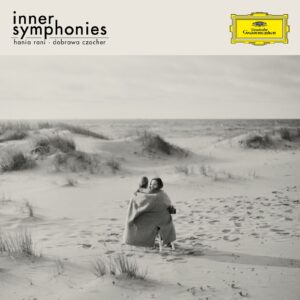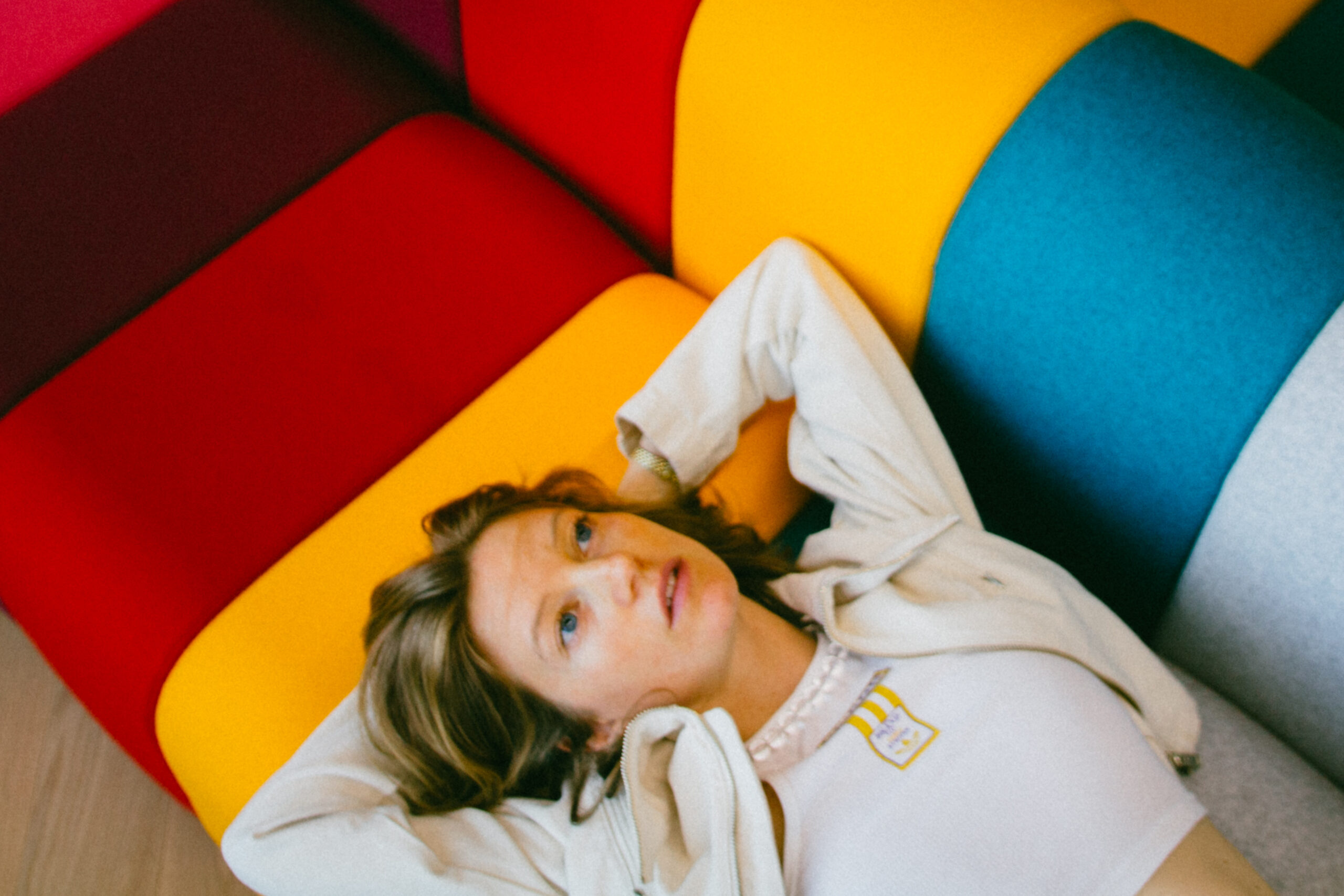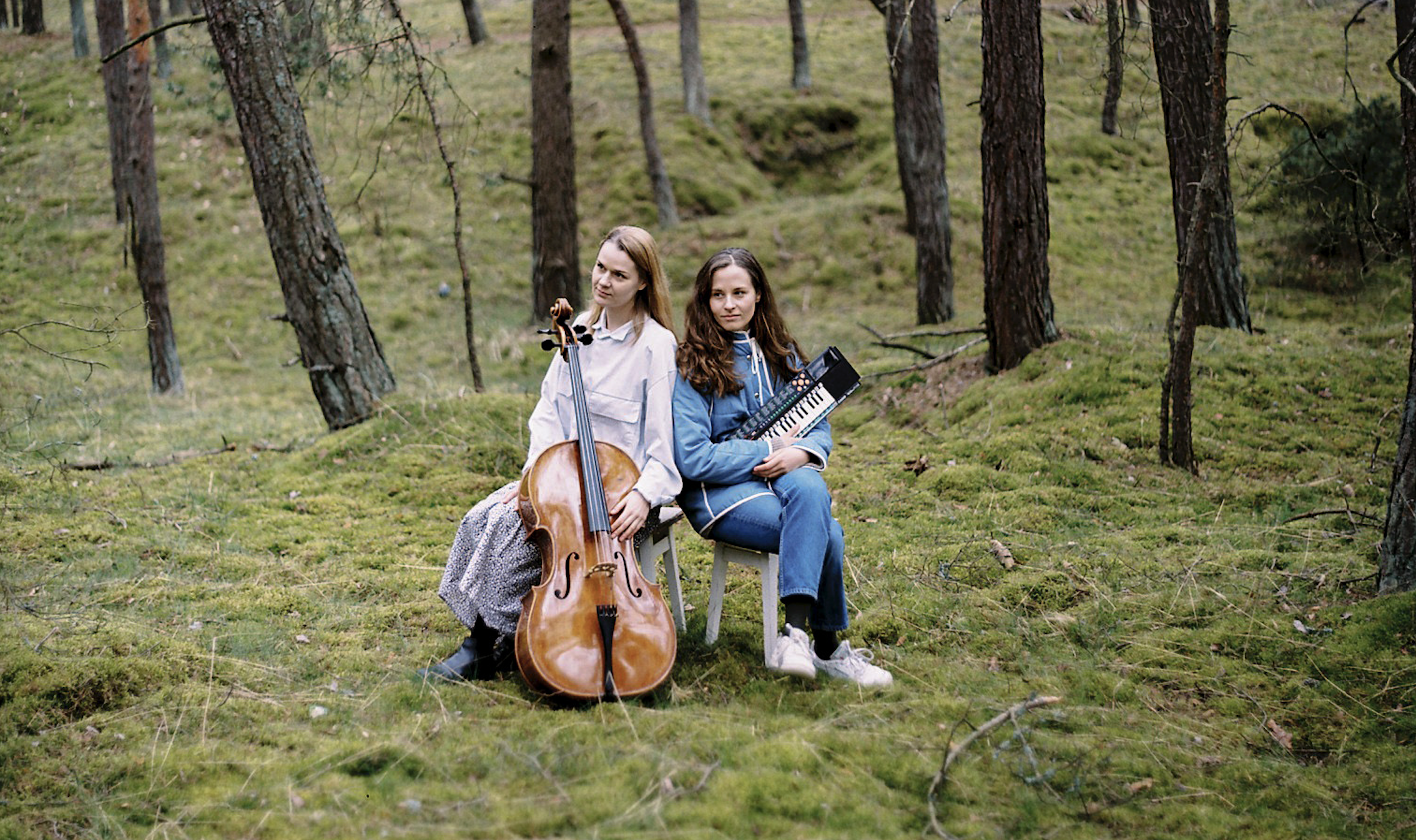Foto-© Krzysztof Narożański
Schon während der letzten Monate drang Hania Rani immer wieder mit ihrer großartigen im Studio gefilmten Live-Session auf Youtube in unsere Wahrnehmung, beim diesjährigen Reeperbahnfestival, wo sie gemeinsam mit ihrer langjährigen Freundin Dobrawa Czocher auftrat, war es dann entültig passiert und die polnische Pianistin, Produzentin und Sängerin hatte uns ganz in ihren Bann gezogen. Umso schöner, dass zuletzt auch gleich mit Inner Symphonies das gemeinsame Album der beiden jüngsten weiblichen Komponisten auf Deutsche Grammophon erschienen ist – Grund genug den beiden einen ausgewachsenen Fragenkatalog zu schicken. Unser Mailer-Interview mit Hania Rani und Dobrawa Czocher!
 First of all: how are you and how were the last few months for you?
First of all: how are you and how were the last few months for you?
D (= Dobrawa): Thank you for asking. Like always when releasing an album there is a lot going on and it’s never enough time. Moreover each of us was still finishing individual obligations – Hania with her third album „Music for film and theater”, me playing projects in Philharmonic Orchestra. In between we would find time for discussing whole graphic aspect for „Inner Symphonies”, we recorded video in beautiful Theater in Cracow where we perform entire album live, we played few first concerts and now finally we start touring. Three singles were released so the listeners could have first impressions about an album and soon the whole thing will be out. We are busy but excited too.
What is your first memory of a contact with music? And when did you start to make music?
D: I can’t remember exactly because, I believe, it was already before I was born 🙂
H (= Hania): My mother is musician (violinist) so from the very beginning music was inherent part of my life. Sometimes I have an impression I can express myself in much more natural way while playing than when talking. I started playing my instrument when I was barely 7 and I remember exactly very strong revelation when my mum showed me Clair de Lune of Claude Debussy and Mozart’s Requiem. For me that was like exploring another planet or journey to the moon. Amazing, spectacular experience. I knew this was my world and my language and the cello enabled me to be part of it. I decided to be a cellist for my life but I didn’t expect I would ever write my own music. This happened quite late, I would say – one and half year ago. It turned out to be another great revelation and new direction in my musical experience.
Who was the biggest influence to get you into classical music (personally and as a musical idol)?
D: Without doubt personally that was my mother. She is a teacher too so the way she would talk about music to her students and to me was always very vivid, full of stories and very inspiring. And my idol from the time when I was starting to play cello was Rostropovich. I guess I thought his technique skills were impossible for human being and I saw him as cello god (I still do).
For us it was very unusual to listen/play classical music when growing up – what drew you into that musical direction and were/are there other musical styles you were experimenting with and would have been interested to follow in?
H: We are back to talking about my mother again. But to complete the picture I must say not only my mother is musician in my family. Both of her sisters are connected to this world too, my uncle is a conductor. When we meet we sing together and play. As I said before – music is like breathing for me, most natural way of communication. And from the other hand there was my father who loves rock from 70s and bands like Pink Floyd, Genesis, The Beatles. Probably surrounding of openness to music from classical to rock engraved in me same approach and curiosity for the different genres.

How did you meet at first and when did you decide to work on music together?
D: We met in Gdańsk, in Musical School at the age of 14. This type of school is not popular in many countries – here all of the typical subjects like math, literature and biology were mixed with those musical ones like instrument lessons, music theory etc. At some point we started playing in piano trio with another friend of ours – Kornelia Grądzka – and this was a moment our friendship and story started to develop. We used to go to chamber competitions together and we were quite successful I must admit. But back then our object of interest was only classical music and classical composers like Debussy, Ravel and Brahms. The story changed a course when we got an invitation to arrange few pieces for the Festival commemorating a name of polish rockstar Grzegorz Ciechowski. At this moment we decided to create a duo and our musical direction went towards more contemporary. Without expectations and big plans we decided to record an album with those arrangements and this is how „Biała flaga” – our debut – happened. Releasing it established existence of our names on the market but we were still very much focused on maintaining our skills as an instrumentalists and we played concerts with that repertoire more for fun than for anything else. Now we are in a very different moment and we approach our journey in a more conscious way.
 What do you like most about the other when it comes to making music?
What do you like most about the other when it comes to making music?
D: I simply love Hania’s ideas and the value that she brings to my own musical proposals. She composes much longer than I so her experience inspires me a lot. She is also the kind of person who is not afraid to try out new things and that gives myself courage to be fearless too.
When did you decide to record an album together and how was your work flow to combine your musical talents?
D: I think each of us knew that „Biała flaga” will be not first and last „fruit” of this collaboration but we were too busy working on our individual artistic paths and in a way we waited for the perfect moment to meet again and talk about new album. This moment happened when Szczecin Philharmonic’s principal, Dorota Serwa, amazed about our debut suggested that she could offer us Szczecin Philharmonic concert hall for making a new record. At that time I was a member of Szczecin Philharmonic Orchestra and I knew this is a great opportunity and perfect conditions for us.
Could you tell a bit about the production process of Inner Symphonies? How, when and where it came into life, what was the best/what the worst moment during production and what is the most told anecdote of that time?
H: „Inner Symphonies” was the first fully produced album by me in my career. I worked already on my previous albums’ production but this time I had way more experience and knowledge to really achieve the sound that we were looking for with Dobrawa.
It was a fascinating journey, maybe of the songs changed a lot from the recording samples, some of them stayed the same and some – developed the ideas that were already there. We finished recordings in May 2020 and I had to take a couple of months break before I started the production process because I was a bit exhausted. When the right moment came and I had enough time to fully concentrate on this project I had a new perspective on this music and the material that we recorded which helped me to develop the ideas that we would not think about before.
I found it extremely interesting to work on processing the cello sound – especially in the Whale’s song – where I reworked the cello samples in the most crazy possible way, so that it sometimes doesn’t sound anymore like cello, but rather like some brass instruments or a real whale.
I am very happy about the final result of the full album – I learnt a lot during the process and it helped me a lot with my other projects, especially for film and theatre.
 Inner Symphonies is your second album together after Biała Flaga – would you say that this time the process of working together was different for you and if so how?
Inner Symphonies is your second album together after Biała Flaga – would you say that this time the process of working together was different for you and if so how?
H: Yes, definitely. Biała flaga is an album with arrangements and a couple of little preludes composed by me. This time Dobrawa also contributed fully as a composer so the workflow was totally different. We composed this album as a composing duo, two equal creatives. Although we both really have a really. Wonderful memories about our 1st album – also because it was the first one and it was a whole new world for us, extremely exciting and interesting.
If I got it right, the album was written during the pandemic – how would you describe did this new reality influence the record?
H: Actually the pandemic, which is of course an awful experience to all of us, helped us in the end because we could finally find enough time to meet and work together without the rush of time. The Recording dates were already planned before the pandemic started but if things would not have stopped around us we would probably never have so much inner peace and space to focus fully on this album working together every day at my family house in Gdańsk. It helped us to forget about the bad things happening around us – because we were scared and felt insecure like everyone else at this time. We decided to focus on music and used this time to work together on a new release.
Con Moto is one of our favorite songs on the record – how was it done, is there a story behind it and when/how did you come up with it?
H: We wanted the album to be varied and full of different colors. We really wanted to have on the album a track that would be for us a virtuosic challenge because we both feel a lot like performers, not only composers and we knew that this album will be also performed live by us.
Idea for composition and it’s title is basically inspired by a will and joy of movement and energy. It does not have any particular story behind it – it’s just pure music and the joy of performing something that will work as a energy booster to both performers and the audience. We even think you can dance to this song 🙂
The bio also says that the album is reflecting your love for the natural world (besides themes of friendship and hope) – whiteout lyrics how do you set these themes in your music, are there always stories behind the songs and if so, could you tell one as an example?
H: I think the best example is a Whale’s song which is basically our will to imagine the song that could be sung by a real whale in the surrounding of the oceans. We knew from the beginning we wanted to dedicate one song to the water and its movement which is something very close to us because we both were growing up by the sea. We thought that we would try to express the movement of the water on which surface is glittering in the rays of the sun. But nothing was really going right and whatever we were trying to do with this song we felt is not good enough. So we started to experiment and somehow one of the Dobrawa’s sounds on cello reminded us of the sound that a real whale makes. We grabbed this idea immediately and understood that we should leave the idea of observing the water from above and we should compose a song that expresses the feeling of being under the water and observing it from the very different side, like whales do. We love how the music gives us hints naturally and we follow them.

There is also an interesting video from Netflix Polska accompanying your song Dunkel, where you have been connected to a brain-computer interface while performing, with the signals being translated into 3D simulated animations in real time – sounds pretty science fiction. How was the process for you, how was this idea born and what did you think about the result afterwards?
H: The idea came from Netflix and it was at the very last moment. They were planning the promotion for their new series called „Open Your Eyes” and thought about creating an interactive video clip showing the processes in the brain of the music performer. What is interesting is that they decided to show it through the music performed on the acoustic instruments like we do – I find it very interesting because it means that performing classical music needs the most expression during the performance which I agree with. And still it remains a mysterious process that is not easy to understand at first sight.
 Hania, Inner Symphonies is already your second release this year, plus seventh record you are releasing since 2015 – how do you stay creative and do you have a working routine to be that productive?
Hania, Inner Symphonies is already your second release this year, plus seventh record you are releasing since 2015 – how do you stay creative and do you have a working routine to be that productive?
H: It’s not as easy as it seems. Beside those albums I have been working on a couple of soundtracks and remixes. Sometimes I feel tired and even afraid that one day I will not be able to Create anything new 🙂 that’s why – observing carefully my own self I try to take breaks in between and surround myself with things that make me think about music from a different perspective. I spent quite a lot of time doing things that have nothing to do with music and in discussion with no-musicians. These moments give me a fresh breath to my own work and approach and very often give more interesting answers. I feel that the creating process is the moment that I am living fullest but also moments that make me really exhausted because I give all myself to it.
Hania, you also sing on some of your songs – how do you decide which songs need lyrics/singing or which songs are instrumental? And would you say that writing music is easier for you then writing lyrics – if so, why would you say so?
H: Well, I know from the beginning that the tune that I am currently working on will become a song or not. I am very sure about it and this decision most of the time defines my composing process. There are few exceptions from this rule but I would say most of the time I know which song will be based on voice and lyrics. Writing lyrics is not easy for me, I am still mastering it. I always want the words to be a necessary way of expression, not something additional. So if I don’t have anything particular in mind I leave the idea. I need to say that singing on stage is a totally new experience but the one that gave me a lot of courage on stage but also understanding for other people. I know that when I am singing I am singing to somebody directly. It’s joy, but also responsibility. Words and voices have a huge power – and I didnt realize it before I started to sing myself.
What did you learn in 2021?
H: That life is very very fragile.










